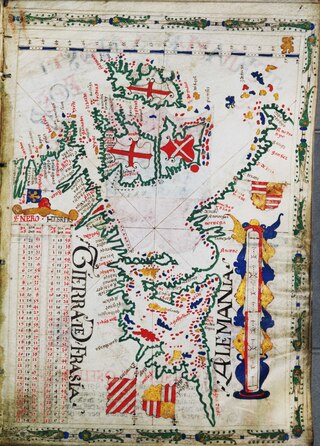
Demographic features of the population of Portugal include population density, ethnicity, education level, health of the populace, economic status, religious affiliations and other aspects of the population.

The Community of Portuguese Language Countries, also known as the Lusophone Community, is an international organization and political association of Lusophone nations across four continents, where Portuguese is an official language. The CPLP operates as a privileged, multilateral forum for the mutual cooperation of the governments, economies, non-governmental organizations, and peoples of the Lusofonia. The CPLP consists of 9 member states and 32 associate observers, located in Europe, South America, Asia, Africa and Oceania, totaling 37 countries and 4 organizations.

The Portuguese people are a Romance-speaking ethnic group and nation indigenous to Portugal, a country in the west of the Iberian Peninsula in the south-west of Europe, who share a common culture, ancestry and language.
Portuguese Luxembourgers are the citizens or residents of Luxembourg whose ethnic origins lie in Portugal.
Afro-Portuguese(Afro portugueses or Lusoafricanos), African-Portuguese(Portugueses com ascendência africana), or Black Portuguese are Portuguese citizens or residents of Portugal with total or partial ancestry from any of the Sub-Saharan ethnic groups of Africa.
As of 2021, Portugal had 1,198,793 inhabitants that were born in a foreign country, out of 10,467,366 inhabitants, accounting for 11.5% of its total population.
Portuguese in the Netherlands are the citizens or residents of the Netherlands whose ethnic origins lie in Portugal.

Mário José Gomes de Freitas Centeno is a Portuguese economist, university professor, and politician. From 2015 to 2020, he was Minister of Finance of Portugal in the government cabinet of Prime Minister António Costa of the Portuguese Socialist Party (PS). He was the president of the Eurogroup and chairman of the board of Governors of the European Stability Mechanism from 2018 to 2020. Previously, he was a board member economist of the Bank of Portugal. On 9 June 2020, he announced his resignation from the Ministry of Finance, effective 15 June. On 16 July 2020, the Council of Ministers approved Centeno's nomination for the post of Governor of the Bank of Portugal, put forward by his successor as Finance minister, João Leão. Centeno is the author or co-author of several scientific publications, books and book chapters related to his areas of interest, such as labour economics, econometrics, microeconomics and contract theory.
Portuguese in Sweden are citizens and residents of Sweden who are of Portuguese descent.
Portuguese in Belgium are the citizens or residents of Belgium whose ethnic origins lie in Portugal.

Portuguese in Norway are citizens and residents of Norway and its external territories who are of Portuguese descent.

Portuguese in Estonia are citizens and residents of Estonia who are of Portuguese descent.

Portuguese in Latvia are citizens and residents of Latvia who are of Portuguese descent.
Portuguese in Lithuania are citizens and residents of Lithuania who are of Portuguese descent.

Portuguese in Croatia are citizens and residents of Croatia who are of Portuguese descent.

Portuguese in Slovenia are citizens and residents of Slovenia who are of Portuguese descent.
Portuguese in Germany are citizens and residents of Germany who are of Portuguese descent.
Portuguese in the Czech Republic are citizens and residents of the Czech Republic who are of Portuguese descent.
Portuguese in North Macedonia are citizens and residents of North Macedonia who are of Portuguese descent.
Portuguese in Austria are citizens and residents of Austria who are of Portuguese descent.











